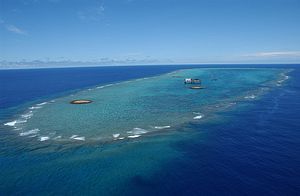The Japanese Embassy in Beijing has filed official protest with China after they admitted to conducting marine surveys around the Japan-held Okinotori island without permission. In mid-December last year, the Japanese Coast Guard intercepted a Chinese research vessel in waters surrounding Okinotori Island. Japan claims the uninhabited Okinotori island in the Pacific Ocean as its southernmost territory, which is 1700 kilometers south of Tokyo, and holds that Okinotori generates a 200 nautical mile exclusive economic zone (EEZ)
Signatories to the UN Convention on the Law of the Sea (UNCLOS) like China are required to obtain permission to conduct research within EEZs. While China acknowledges Japan’s ownership of the island, the latest political row rests on China’s long-standing position that Okinotori “doesn’t fit the basic requirements to be recognized as an island” – and thus to generate an EEZ. China views Okinotori as a reef or rock at most, emphasizing that during high tide Okinotori has only 10 square meters of land area, roughly the size of a bedroom. The Chinese vessel angered Japanese authorities by wording the research mission as one on the “high seas” and “in accordance to the law.” China has repeatedly referenced article 121 of UNCLOS, which holds that “3. Rocks which cannot sustain human habitation or economic life of their own shall have no exclusive economic zone…” (China has its own difficulties with this article in the South China Sea, where an arbitral tribunal ruled that none of the features are entitled to island status and an EEZ).
For Japanese nationalists, Okinotori Island is a matter of national pride and boils down to an issue of sovereignty. The 400,000 square kilometer (200 nautical miles) EEZ generated by the territory is a boon for a resource scarce Japan. The Japanese government is also fed up with China’s public remarks that Japan’s EEZ claim is illegal as well as their dismissal of Okinotori’s maritime features. Japan is suspicious that China’s ocean survey is actually a cover for investigating the area’s natural resources.
In October last year, the relationship between China and Japan looked to be on the mend at a bilateral summit meeting where both leaders put aside hostilities and pledged a new historic commitment to building stronger economic links. The relationship was supposed to move “from competition to coexistence.” China’s decision to conduct an ocean survey around the sensitive Okinotori Island looks like a confusing blow to the delicate and freshly forged ties.
Mathieu Duchatel, a maritime security expert and Director of the Asia Program at the Institut Montaigne in Paris, says China’s abrupt confrontation over Okinotori Island can be linked to the recent cooperation and stabilization with Japan on the Senkaku islands territorial dispute, which he describes as being temporarily frozen.
The last time the tiny Okinotori Island encountered territorial interference was from Taiwan back in March 2016 and the topic has since retreated from public attention.
But Duchatel points out that the timing of China’s latest act of defiance can be explained by a tit-for-tat scenario. “China is sending a message that they are reacting to Japan’s policy in the South China Sea… Unless China exerts a frequent presence around Okinotori Island, which I don’t see why they would, the issue will lose steam,” he says.
During Japan’s anti-submarine warfare exercises near the South China Sea late last year, China turned a blind eye, refraining from public reaction.
Although Japan has lodged a formal complaint with China, the issue has remained relatively quiet on the international front. No legal procedures have been pursued by China or other parties like South Korea and Taiwan that also contest Japan’s claim to an EEZ in the rich fishing waters surrounding Okinotori Island.
Duchatel says the overall relationship between China and Japan is being treated separately. He says China is signaling that there are issues they plan to cooperate on despite the difficulty and issues they won’t. “Japan challenging China in the South China Sea and China challenging Japan on Okinotori Island is the way the countries remind each other that they disagree on some key issues,” he explains.

































